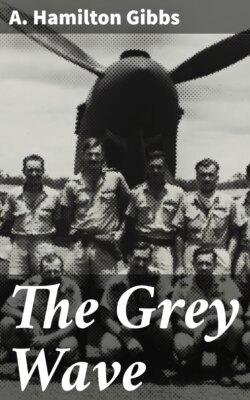Читать книгу The Grey Wave - A. Hamilton Gibbs - Страница 6
1
ОглавлениеIn June, 1914, I came out of a hospital in Philadelphia after an operation, faced with two facts. One was that I needed a holiday at home in England, the second that after all hospital expenses were paid I had five dollars in the world. But there was a half-finished novel in my trunk and the last weeks of the theatrical tour which had brought me to Philadelphia would tide me over. A month later the novel was bought by a magazine and the boat that took me to England seemed to me to be the tangible result of concentrated will power. “Man proposes....” My own proposal was to return to America in a month or six weeks to resume the task of carving myself a niche in the fiction market.
The parting advice of the surgeon had been that I was not to play ball or ride a horse for at least six months. The green sweeping uplands of Buckinghamshire greeted me with all their fragrance and a trig golf course gave me back strength while I thought over ideas for a new novel.
Then like a thunderbolt the word “War” crashed out. Its full significance did not break through the ego of one who so shortly would be leaving Europe far behind and to whom a personal career seemed of vital importance. England was at war. The Army would be buckling on its sword, running out its guns; the Navy clearing decks for action. It was their job, not mine. The Boer War had only touched upon my childish consciousness as a shouting in the streets, cheering multitudes and brass bands. War, as such, was something which I had never considered as having any personal meaning for me. Politics and war were the business of politicians and soldiers. My business was writing and I went up to London to arrange accommodations on the boat to New York.
London was different in those hot August days. Long queues waited all day,—not outside theatres, but outside recruiting offices,—city men, tramps, brick-layers, men of all types and ages with a look in their eyes that puzzled me. Every taxi hoot drew one’s attention to the flaring poster on each car, “Young Men of England, Your King and Country need you!”
How many millions of young men there were who would be glad to answer that call to adventure,—an adventure which surely could not last more than six months? It did not call me. My adventure lay in that wonderland of sprouting towers that glistened behind the Statue of Liberty.
But day by day the grey wave swept on, tearing down all veils from before the altar of reality. Belgian women were not merely bayoneted.
“Why don’t we stop this? What is the Army doing?” How easy to cry that out from the leafy lanes of Buckinghamshire. A woman friend of mine travelled up in the train with me one morning, a friend whose philosophy and way of life had seemed to me more near the ideal than I had dreamed of being able to reach. She spoke of war, impersonally and without recruiting propaganda. All unconsciously she opened my eyes to the unpleasant fact that it was my war too. Suppose I had returned to New York and the Germans had jumped the tiny Channel and “bayoneted” her and her children? Could I ever call myself a man again?
I took a taxi and went round London. Every recruiting office looked like a four-hour wait. I was in a hurry. So I went by train to Bedford and found it crowded with Highlanders. When I asked the way to the recruiting office they looked at me oddly. Their speech was beyond my London ear, but a pointing series of arms showed it to me.
By a miracle the place was empty except for the doctor and an assistant in khaki.
“I want to join the Cavalry,” said I.
“Very good, sir. Will you please take off your clothes.”
It was the last time a sergeant called me sir for many a long day.
I stripped, was thumped and listened to and gave description of tattoo marks which interested that doctor greatly. The appendix scar didn’t seem to strike him. “What is it?” said he, looking at it curiously, and when I told him merely grunted. Shades of Shaw! I thought with a jump of that Philadelphia surgeon. “Don’t ride a horse for six months.” Only three had elapsed.
I was passed fit. I assured them that I was English on both sides, unmarried, not a spy, and was finally given a bundle of papers and told to take them along to the barracks.
The barracks were full of roughnecks and it occurred to me for the first time, as I listened to them being sworn in, that these were my future brother soldiers. What price Mulvaney, Learoyd and Ortheris? thought I.
I repeated the oath after an hour’s waiting and swore to obey orders and respect superior officers and in short do my damnedest to kill the King’s enemies. I’ve done the last but when I think of the first two that oath makes me smile.
However, I swore, received two shillings and three-pence for my first two days’ pay and was ordered to report at the Cavalry Depot, Woolwich, the following day, September 3, 1914.
The whole business had been done in a rush of exaltation that didn’t allow me to think. But when I stepped out into the crowded streets with that two shillings rattling in my pocket I felt a very sober man. I knew nothing whatever of soldiering. I hardly even knew a corporal from a private or a rifle from a ramrod, and here I was Trooper A. H. Gibbs, 9th Lancers, with the sullen rumble of heavy guns just across the Channel—growing louder.
